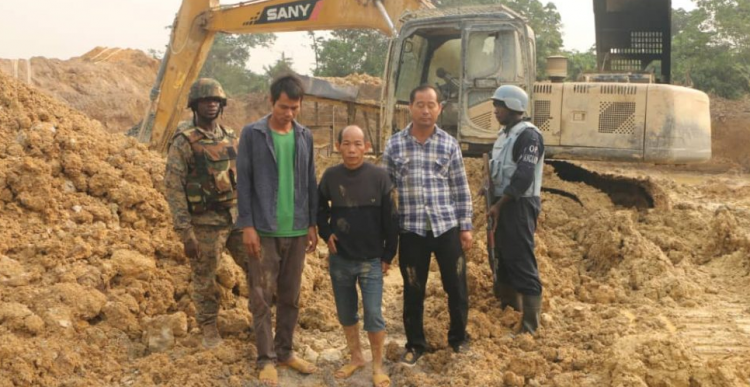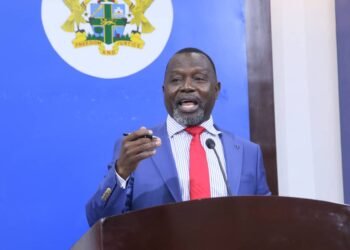Gabriel Botchwey, an Associate Professor of Political Science at the University of Education, Winneba, has cautioned that Ghana’s fight against illegal gold mining, popularly known as galamsey, cannot be won through pressure and crackdowns alone.
He argued that the problem has evolved beyond its artisanal origins into a hybrid system driven by foreign participation, corruption, and weak regulation, making state-led enforcement insufficient without structural reforms.
In an interview analyzing the dynamics of small-scale mining in Ghana, Prof. Botchwey highlighted how the practice, once largely artisanal, has transformed into large-scale operations powered by heavy machinery.
“In the past, people in traditional small-scale mining mainly dug by hand, using picks and shovels. Nowadays, heavy machinery such as large excavators is increasingly being used”.
Gabriel Botchwey, an Associate Professor of Political Science at the University of Education, Winneba
He pointed out that companies from China, in particular, have become central players in the industry. Although Ghanaian law restricts small-scale mining to citizens, Chinese operators have entered the sector by collaborating with local miners, providing technology and financing.
For Prof. Botchwey, the environmental toll of this shift has been significant, as rivers in the western regions of Ghana, once dependable sources of drinking water, are now heavily polluted with chemicals used in gold extraction.

He decried that several communities and urban centers that rely on these rivers are forced to spend far more on water treatment than in the past.
“Little consideration is given to the environment. Chemicals from gold mining are polluting the rivers, and cities and communities that depend on the water have to invest much more in clean drinking water”.
Gabriel Botchwey, an Associate Professor of Political Science at the University of Education
Why is it illegal
According to him, the illegality of this form of mining stems from two key issues. First, foreigners are prohibited from engaging in small-scale mining, and second, many of the Ghanaian-run mines are not registered or licensed. This lack of regulation means the operations ignore environmental safeguards and protections for water bodies.
While many critics have blamed Chinese involvement for fueling illegal mining, Prof. Botchwey emphasized that the situation is more complex. He argued that foreign participation became entrenched largely because the Ghanaian state neglected small-scale mining for decades.
Without access to credit, modern technology, or technical support, Ghanaian miners turned to Chinese partners who filled this void.
“Much of what used to be small-scale artisanal mining would no longer function today without the Chinese. They are basically indispensable because the Ghanaian government has ignored and neglected small-scale mining for many years. The Chinese filled this gap, and Ghanaian mine operators gratefully accepted it.”
Gabriel Botchwey, an Associate Professor of Political Science at the University of Education

The results have been dramatic. Small-scale mining’s share of Ghana’s total gold production has surged from just 11 percent in 2006 to 40 percent today.
Prof. Botchwey warned that a return to small-scale artisanal mining as it was in the past is hardly conceivable, stressing that the heavy machinery is there and would remain even if the Chinese are successfully pushed out.
Military Force not Enough
On the government’s approach, Prof. Botchwey criticized the overreliance on police and military deployments. In 2017 and 2018, the state even imposed a 20-month ban on small-scale mining altogether.
Yet, during this period, gold production from small mines continued to rise, showing the ineffectiveness of bans and crackdowns. “Pressure alone will not solve the problem,” he said.
Prof. Botchwey added that enforcement efforts are further undermined by political and bureaucratic corruption.
“Many politicians and government officials who are supposed to crack down on illegal small-scale mining are themselves involved in it and earn money from it. Some of them hold mining concessions themselves, or they collect bribes from mine operators who pay their way out of inspections”.
Gabriel Botchwey, an Associate Professor of Political Science at the University of Education
Toward a Hybrid Model
To improve the situation, Prof. Botchwey called for a rethinking of Ghana’s mining laws and regulatory structures. He argued that the current distinction between small-scale artisanal mining and large-scale industrial mining no longer reflects the realities on the ground.
Instead, Ghana needs to legally recognize a new “medium-scale” or hybrid mining category that captures today’s operations.
“What used to be artisanal mining has long since developed into a hybrid form between large-scale and small-scale mining. If this hybrid form were legally recognized, it could be regulated by the state”.
Gabriel Botchwey, an Associate Professor of Political Science at the University of Education
He stressed, however, that regulation should not be imposed solely from the top down. Local chiefs, who exercise traditional authority and have deep knowledge of their communities, must be part of the process.

“The chiefs who are in charge at the local level would also have to be involved. They know best where and under what conditions gold is mined in their regions”.
Gabriel Botchwey, an Associate Professor of Political Science at the University of Education
Yet, he cautioned that reforms will only succeed if corruption is confronted head-on. “Of course, the regulation of a new medium-sized mining sector can only succeed if politicians and authorities are serious about it and corruption is combated,” he added.
Prof. Botchwey’s remarks reflect a sobering reality: Ghana’s fight against illegal gold mining requires more than bans, raids, or short-term campaigns.
With small-scale mining now a cornerstone of the gold industry, and foreign partnerships entrenched, the problem demands a pragmatic legal framework, strong local participation, and uncompromising accountability.
The warning is clear—without structural reforms, illegal mining will continue to thrive, and pressure alone will not deliver a solution.
READ ALSO: Govt Revives Tema Shipyard, Begins Modern Freight Park to Boost 24-hour Economy























